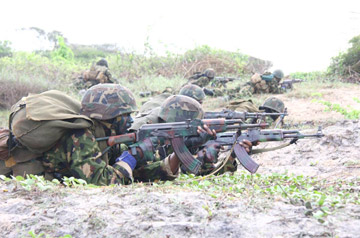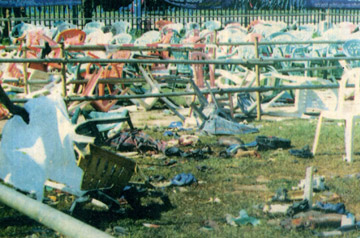|
Opinion: EU resolution:
Extraordinary interest in Lanka's internal affairs
By K.M.H.C.B. Kulatunga
Certain countries, some international organisations and their agents
here and abroad, have already started their campaigns to intimidate Sri
Lanka before the next United Nations Human Rights Council (UHHRC)
sessions scheduled for March next year.
|

Security Forces personnel in operations against Tiger
terrorists. (File photo) |
It looks as if the European Union has no other business to attend
than showing extraordinary interest in internal affairs of Sri Lanka.
Similarly, the British Parliament - the House of Commons, appears to
have no other business to attend rather than discussing internal matters
of Sri Lanka on regular basis.
Even at the recent Commonwealth Summit (CHOGM 2013) certain countries
made obvious attempts to focus attention of Sri Lanka as if the
Commonwealth is all about Sri Lanka. The United Nations Human Rights
Council (UNHRC) is no exception and its successive sessions discuss Sri
Lanka's internal matters while turning a blind eye on serious human
rights violations by the US-led NATO forces in Iraq and Afghanistan as
the US drone attacks in Pakistan which have killed thousands of people.
The manner in which these people in the international community
discuss and pass resolutions in Sri Lanka gives a clear indication that
they have a well orchestrated agenda to tame Sri Lanka and turn its
foreign policy to a melody of the West.
In spite of the economic crisis, unemployment and other severe issues
that the United Kingdom is facing, British Prime Minister David Cameron
has more time to discuss on matters pertaining to Sri Lanka that those
grave problems faced by his own country.
Undue concern
Despite the economic crisis in most European countries, except for a
handful such as Germany, the European Union waste its time on passing
resolutions on Sri Lanka which is not a member country. Instead of
poking their fingers in to the internal matters of a sovereign country
as Sri Lanka, the European Union has much more burning issues to attend,
such as economic crisis in some of its member countries such as Spain.
Why do these interested parties in the West show undue concern about
Sri Lanka? That could well be due to three factors. First and foremost,
certain politicians in countries such as Britain and Canada heavily
depend on the votes of the Tamil Diaspora for their political survival.
They have no option but to dance the fandango with the LTTE rump and the
Tiger sympathisers in their countries. Hence, the undue worry of people
such as David Milliband and David Cameron are quite understandable.
Secondly, some political leaders in the West have been mislead by the
false propaganda which the LTTE had been carrying out. After the
vanquishing of the LTTE leadership, the Tiger cohorts have taken over
the operations of that well-knit anti-Sri Lankan campaign.
|

The scene at the Town Hall after the failed assassination
attempt on President Chandrika Kumaratunga. (File photo) |
Even the photographs of the LTTE's Kabithigollawa bus bomb victims
have been used in pro-LTTE campaigns in the West, projecting that those
children had been killed by Sri Lanka's Security Forces. Though the
Government has tried to counter those false LTTE campaigns, those
efforts were not sufficient to face such a strong campaign that had been
carried out by the LTTE. As a result, there is a significant section in
the international community, who have been carried away by the false
campaigns of the LTTE rump.
'Credible investigation'
The third reason was inaccurate information and lack of knowledge by
certain quarters in the international community. There are several
political leaders of the West who are still baffled on Sri Lanka's
humanitarian operation.
Certain countries in the West, due to one of the three above reasons,
are raring to take Sri Lanka to task at the next UNHRC Sessions in
Geneva in March, 2014. The die-hard critics of Sri Lanka, under the
blessings of the LTTE rump, will undoubtedly push for an official
investigation into the last stages of the battle.
In case they fail to achieve that, they will push to appoint a
Special Rapporteur to look into the possibility of launching an official
investigation. Certain Western leaders have been constantly harping on a
“credible investigation”.
But it seems that they would never be satisfied with a local
investigation though it would be independent to the highest level. All
what they target is to have an investigation of their choice and
discredit Sri Lanka to that they could take the country to task the
worst possible manner of their choice.
The UN Secretary General certainly has the discretion and the
authority to call for reports or seeking expert advice on the various
subjects with which he has to deal in the course of his duties. That
authority also covers the commissioning of reports to find out where the
UN may have failed in the past, to extract lessons for the future.
However, could that discretion or authority extend to commissioning
reports designed to be submitted indirectly to official organs of the
UN, such as the UNHRC or to compel collective action by the latter
organs against a member country?
There is no doubt that the UN Secretary General's actions are highly
illegitimate and in fact illegal under the UN Charter, specifically,
Articles 2(7), 99 and 100.
If the Secretary General or anyone else thinks that high Sri Lankan
officials committed war crimes during the last stages of the battle, and
they have some evidence to back-up those allegations, they are perfectly
free to go before the UN or one of its relevant organs such as the UN
Security Council and present such evidence.
Controversial documents
In such an event, Sri Lanka naturally has a right of response. If,
after such response, the relevant UN organ still feels the allegations
have merit, it can request or order further inquiries. Instead of doing
so, UNHRC continued to press Sri Lanka to support the interested
elements in the West. Has she shown the same interest in dealing with
serious and grave human rights violations by the US-led NATO forces in
Afghanistan or US drone attacks in Pakistan which have killed thousands
of civilians?
The Secretary General's controversial reports have never been
authorized, sanctioned or requested by the UN General Assembly, the
Security Council or the UNHRC for that matter. Such controversial
documents have never been officially tabled before in any such organ.
That has prevented Sri Lanka presenting its case at a proper forum or
to respond the wild allegations by certain quarters in the West.
Undoubtedly, all these people who level allegations against Sri Lanka
have their own agenda for one of the reasons identified earlier in this
article.
We have one simple question to ask from all those who have been hard
critics and attempt to take Sri Lanka to task, purely for the ‘sin’ of
eradicating terrorism and vanquishing the LTTE leadership to ensure a
peaceful environment to live in harmony for 21 million people?
When the entire nation was devastated by LTTE’s merciless terror and
lives of over 21 million people were in danger, none of those godfathers
of human rights ever uttered a word of comfort. Sri Lanka, with the
support of only a few friendly countries, had to wage its own battle for
survival.
Drone attacks
Now that we have crushed LTTE terror and established peace, we see
more and more prophets emerging to preach us on human rights and
reconciliation. We have enough and more examples how the attacks by
US-led NATO forces killed thousands of hapless civilians in Kuwait, Iraq
and Afghanistan.
What right does the US has to enter the airspace of a sovereign
country as Pakistan to launch drone attacks as and when they wish?
Neither UN Secretary General Ban Ki-Moon nor UNHRC chief Navi Pillay has
ever uttered a word on those gross human rights violations which have
killed hundreds of innocent civilians.
We wonder whether British Prime Minister David Cameron, who
unilaterally set deadlines to Sri Lanka, has even thought of setting
such deadlines to his ally. Cameron has conveniently ignored the human
rights of Pakistani civilians killed due to US drone attacks. Instead,
he continues to harp on the human rights of LTTE terrorists killed when
confronting with a legitimate army of a sovereign state. Will the US or
UK treat human rights of Al Qaeda terrorists in similar manner?
Economic prosperity
As President Mahinda Rajapaksa had told the state banquet hosted by
his Kenyan counterpart Uhuru Kenyata at the State House in Nairobi on
Friday, Sri Lanka has now entered an era of peace, having overcome the
threat of terrorism, and the country now stands undivided under one
flag.
We stand undivided, under one flag, committed to achieving
sustainable economic prosperity, to be shared by all communities. Sri
Lanka is now enjoying rapid economic development, with tourism becoming
a major growth sector. There is a stable environment for investment
provides many opportunities for the business communities.
All these things have been achieved after the eradication of
terrorism. There was a time which even the international airlines pulled
out from their operations to Colombo due to terrorism risk and there was
a heavy insurance surcharge on ships that come to Sri Lanka. We are a
nation which had undergone immense hardships due to LTTE terror.
If not for the political sagacity of President Rajapaksa, we would
have still found bombs exploding in Colombo and other cities from time
to time. His right political leadership and the supreme sacrifices of
the Security Forces have ensured us a safe today for all communities to
live in perfect peace and harmony.
The international community should not disrupt the peaceful
environment that prevails now with all communities making every effort
to strength national reconciliation. We would never allow the West to
rob our hard-earned peace! |

